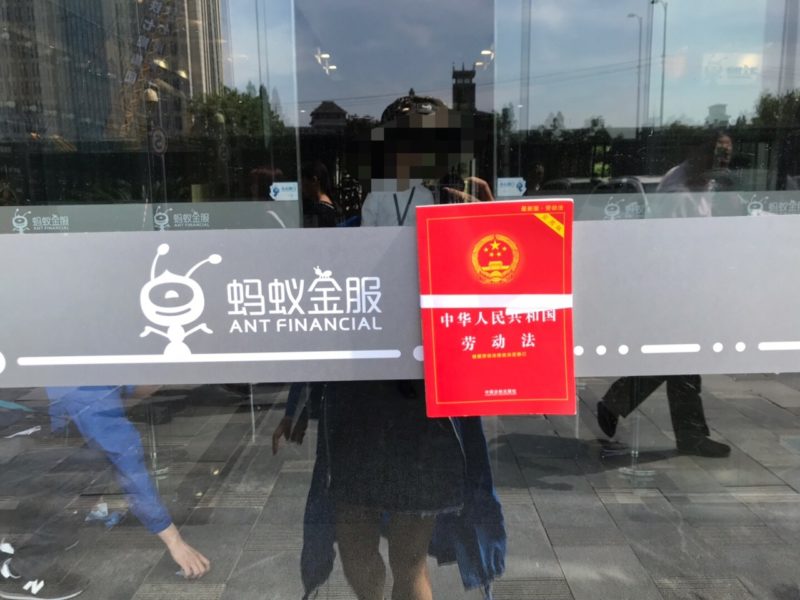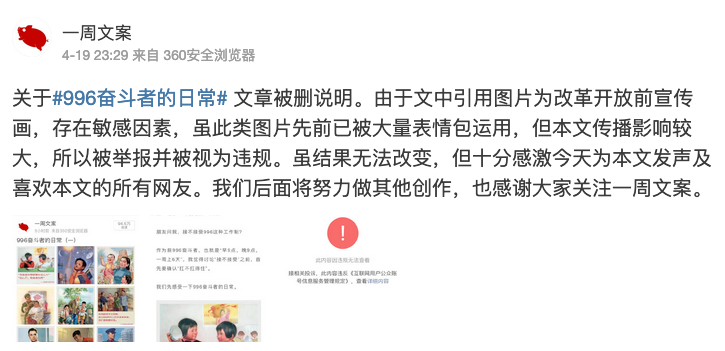Acceptable Protest: The 2019 workplace meme that’s thriving on China’s internet

Internet memes about social issues have a spotty history on China’s internet, where netizens have had to evade, obfuscate and mask their posts in an evolving game of censorship cat and mouse. This was the case with the infamous grass mud horse meme of the late 2000s, as it was with last year’s much reported #MeToo 🍚🐰 sexual harassment meme. Yet this year, the 996 workplace protest meme has been allowed to thrive on the Chinese internet unfettered by the forces that be… sort of.
What is 996?

996 is a shorthand for having to work from 9am to 9pm 6 days a week. The meme has been publicly around since 2015 (see TechNode’s mini-history of the term) and usually refers to the long working hours at tech companies in China. It recently made headlines around the world after a group of Chinese tech workers published 996.ICU: an online letter and GitHub repository decrying the practice. “If you continue to tolerate the ‘996’ work schedule, you will risk your own health and might need to stay in an Intensive Care Unit someday.” In response to the letter, the CEOs of Alibaba, JD.com and Sogou all rose to publicly defend the practice, which only furthered its popularity worldwide.

At the time of writing, there were over 240,000 GitHub users who starred (favorited) the repository in solidarity with China’s tech workers, making it the second most-starred repository on all of GitHub. But that’s not the only figure of note – the project also has 500+ contributors and has been forked (remixed, loosely speaking) over 20,000 times. These high figures are proof that the 996.ICU creators skillfully leveraged GitHub’s open collaboration features to attract people’s attention and to create a space for building an online movement (and meme) together.
The 996 meme, of course, has a life that extends far beyond the confines of GitHub. Here we want to capture how that conversation spilled out onto Chinese social networks and how China’s tech giants tried to control the discussion.
Gallery of image memes
Beyond GitHub, there are a wealth of image memes that have been allowed to roam (relatively) freely on the Chinese internet. Most visually striking is this series of remixed classic government PSA posters by Sina Weibo user 一周文案 (“One Week Copywriter”) that was widely circulated on the social network:


While these posters were squarely anti-996, Sina Weibo user 少年不打太极 (“Teenager does no Tai Chi”) captured a wider spectrum of the debate in their post, which includes the following images:



Discussion about 996 was similarly vibrant on media social networking site Douban. One forum thread, 我们该如何对抗“996”?(How should we fight 996), was seen by over 2.5 million people and followed by 1500+ users. Within that thread, one image set grew so popular that it spilled over onto Sina Weibo, where it appeared on many posts related to 996:

The image set comprises TV screen captures of a speech given by e-commerce giant Dangdang CEO Guoqing Li as he criticizes 996 work culture. In it, he plays the kindly, wise patriarch, in stark contrast to his tech CEO peers at Alibaba, JD.com and Sogou who defended the practice
The images and discussion above are still readily accessible a month after the 996 meme became an international news story. That they survived this long and are still easy to find suggests that the authorities in China decided to let the discussion play out rather than stifle it with its censors’ tools. In fact, the government seems to be publicly denouncing 996 as well – major government-controlled newspapers China Daily and Xinhua News both published editorials to that effect.
But the meme didn’t roam completely free
Even though the government didn’t step in to interfere, China’s tech companies jumped in to defend their honor. To begin with, there are at least several instances where Sina Weibo stepped in to moderate the conversation – not to kill it, but just to tone it down a little. For example, the original post with the remixed PSA posters above was taken down, according to the creator, on grounds that it a) contained sensitive elements from its use of propaganda posters, and b) had become too popular and controversial. One screen capture of the post indicates that it had at least 3400 shares, 400 comments and 2300 likes.

Yet Weibo did not ban all instances of the image on its platform, and the images can still be found on many other, albeit less popular, posts. Outside of Weibo, the images have not provoked the ire of any larger powers that be and can be found on the websites of multiple online publications.
Chinese tech giants also fought back in one other obvious way, though it was a half-hearted effort at best. As Abacus and the Economist report, Alibaba, Tencent, Qihoo 360 and Xiaomi blocked access to 996.ICU on web browsers that they had control over. The block, however, seems to have been limited to the online letter and/or GitHub repository, and was not applied to the rest of GitHub.
🕘 🕘 🕡
When the 996 meme first made headlines abroad, many worried that the Chinese government would step in and force Microsoft (who owns GitHub) to block access to 996.ICU within China. Western press outlets even began lionizing Microsoft employees as protectors of free speech after a group of them published an online letter asking their company not to censor itself. Luckily for the company’s executives, it never came to that. Instead, China’s tech companies, government newspapers and kindly CEO patriarchs all worked together (wittingly or not) to limit the furor, steer the discussion, and create just enough room so that a workplace protest meme may survive on the Chinese internet of 2019.
This article is licensed under a Creative Commons Attribution-NonCommercial 4.0 International License.
5 comments on “Acceptable Protest: The 2019 workplace meme that’s thriving on China’s internet”